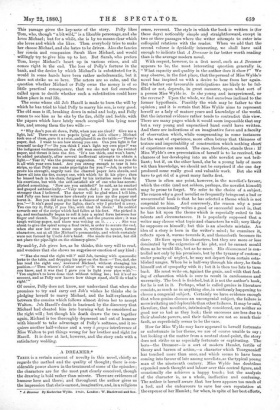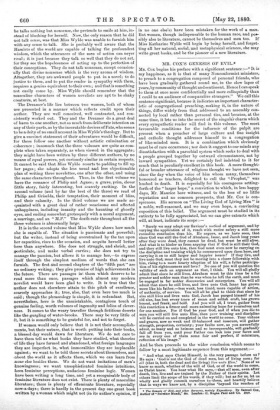A DREAMER.*
THERE is a certain amount of novelty in this novel, chiefly as regards the method and the quality of thought; there is con- siderable power shown in the treatment of some of the episodes; the characters are for the most part clearly conceived, though the drawing is bold, rather than minute. There are evidences of humour here and there.; and throughout the author gives us the impression that she is earnest, imaginative, and, in a religious * A Dreamer By Katherine Wylde. 3 vole. London W. Blackwood and Son.
sense, reverent. The style in which the book is written is (for these days) noticeably simple and straightforward, except in two or three passages where the writer attempts to enter into colloquial relations with the reader. When we add that the second volume is decidedly interesting, we shall have said enough to indicate that A Dreamer is far better worth reading than is the average modern novel.
With respect, however, to a first novel, such as A Dreamer appears to be, the most interesting question generally is, "What capacity and quality in the author does it show P" We may observe, in the first place, that the perusal of Miss Wylde's novel has inspired us with a desire to hear from her again. Butwhether our favourable anticipations are likely to be ful- filled or not, depends, in great measure, upon what sort of a person Miss Wylde is. Is she young and inexperienced, or- the reverse P Upon the whole, we find ourselves inclined to the. former hypothesis. Possibly the wish may be father to the opinion ; and it is certain that Miss Wylde aims to repreaent herself as a lady of mature years and knowledge of the world. But the internal evidence rather tends to contradict this view. There are many pages which it would seem impossible that any but a very young and unpractised hand could have written- And there are indications of an imaginative force and a faculty of observation which, while compensating in some instances for the want of experience, more often betray that thinness of texture and improbability of construction which nothing short of experience can amend. The case, therefore, stands thus : If Miss Wylde's own presentation of herself is to be received, the chances of her developing into an able novelist are not bril- liant ; but if, on the other hand, she be a young lady of more wit than knowledge, we should not be surprised if she one day produced some really good and valuable work. But she will have to get rid of a great many faults first.
There is often one point, however, in the novelist's favour, which the critic (and not seldom, perhaps, the novelist himself) may be prone to forget. We refer to the choice of a subject. The reason why a, good novelist so frequently brings out a bad or unsuccessful book is that he has selected a theme which is not congenial to him. And conversely, the reason why a poor novelist occasionally writes a good or successful novel is, that he has hit upon the theme which is especially suited to his. talentsand circumstances. It is popularly supposed that a writer may choose what topic and characters he will; very likely be supposes so himself; but this is an absolute mistake. An idea of a story is born in the writer's mind; he examines it, reflects upon it, warms towards it, and thenceforth becomes its. slave. He fixes upon his characters, but they are more or less dominated by the exigencies of his plot, and he cannot mould them as he would like, but as he must. His denouement is con- trolled not only by his promisees, but by the tyranny of custom ; under penalty of neglect, he may not depart from certain esta- blished usages. When he is half-way through his story, he finds himself out of sympathy with it ; but it is then too late to turn back. He must write on, against the grain, and with that feel- ing of exhaustion which is sure to result in carelessness and unveracity. The book is finished, but it is not the author's book, for he is not in it. Perhaps, what is called genius in literature consists, as much as in anything else, in uniformly happening to choose a congenial subject. Certainly we have evidence enough that when genius chooses an uncongenial subject, the failure is more irritating and deplorable than other failures. It may be said, therefore, that novelists, intrinsically considered, are neither ea good nor so bad as they look ; their successes are less due to their absolute powers, and their failures are not so much their fault, as superficially seems to be the case.
How far Miss Wylde may have appeared to herself fortunate or unfortunate in her theme, we are of course unable to say ; but looking at the matter from a neutral stand-point, the story does not strike us as especially fortunate or captivating. The hero—the Dreamer—is a sort of modern Hamlet, fertile of theory and barren of action,—a character which Tourgnenieff has touched more than once, and which seems to have been coming into favour of late among novelists, as the typical young man of the nineteenth century. Miss Wylde has doubtless expended much thought and labour over this central figure, and occasionally she achieves a happy touch ; but the analysis of the character is, as a whole, ineffective and confusing. The author is herself aware .that her hero appears too much of a fool, and she endeavours to save her own reputation at the expense of her Hamlet; for when, in spite of her best efforts,
he talks nothing but nonsense, she pretends to smile at him, in- stead of blushing for herself. Now, the only reason that he did not talk sense, was that Miss Wylde was unable to furnish him with any sense to talk. She is probably well aware that the Hamlets of the world are capable of talking the profoundest wisdom, which the utterances of the men of action can neyer rival ; it is just because they talk so well that they do not act, for they see the hopelessness of acting up to the perfection of their conceptions. They do net talk nonsense, except occasion- ally that divine nonsense which is the very aroma of wisdom. Altogether, they are awkward people to put in a novel; to do justice to them, and to put the reader in sympathy with them, requires a genius equivalent to their own ; and that is something not easily come by. Miss Wylde should remember that the masculine characters of women novelists are apt to be shaky creatures, at best.
The Dreamer's life lies between two women, both of whom -nre presented in a manner which reflects credit upon their author. They are well conceived, well contrasted, and con- sistently worked out. They and the Dreamer do a great deal of harm to one another, not so much from deliberate intention on any of their parts, as by the inscrutable devices of Fate, who seems to be a deity of no small account in Miss Wylde's theology. But to give a succinct statement of their adventures would be difficult, for these follow one another without artistic culmination or 'coherence; insomuch that the three volumes are quite as com- plete when taken separately, as when viewed in the aggregate; they might have been written by three different authors, by no means of equal powers, yet curiously similar in certain respects. It cannot be said that Miss Wylde resorts to padding to fill up her pages ; she adopts the less usual and less objectionable plan of writing three novelettes, one after the other, and using the same characters throughout. Thus, in the first volume we have the romance of Philip and Agnes; a grave, prim, clever little story, fairly interesting, but scarcely exciting. In the second volume (and by far the best of the three) we read of Philip and Griselda, their temptation, their moment of bliss, and their calamity. In the third volume we are made ac- quainted with a great deal of rather wearisome and affected unhappiness, including insanity and the haunting of ghostly -eyes, and ending somewhat grotesquely with a moral argument, a marriage, and an " M.P." The death-rate throughout all the three volumes is abnormally large.
It is in the second volume that Miss Wylde shows how much she is capable of. The situation is passionate and powerful; but the writer, instead of being overstrained by the tax upon her capacities, rises to the occasion, and acquits herself better here than anywhere. She does not struggle, and shriek, and gesticulate, and make verbal curries ; she does not try to manage the passion, but allows it to manage her,—to express itself through the simplest medium of words that she can furnish. The first and second chapters of the "fifth part" are no ordinary writing; they give promise of high achievements in the future. There are passages in'. them which deserve to be read more than once, passages which almost any modern novelist would have been glad to write. It is true that the author does not elsewhere attain to this pitch of excellence, scarcely approaches it; true, also, that even here too much is said ; though the phraseology is simple, it is redundant But, nevertheless, here is the unmistakable, contagious touch of -genuine feeling, worth volumes of ingenuity and folios of clever- ness. It comes to the weary traveller through fictitious deserts like the gurgling of water-brooks. There may be very little of it, but it is something to be grateful for, and not to forget.
If women would only believe that it is not their accomplish- ments, but their nature, that is worth putting into their books, a blessed day would dawn for literature. We do not care to have them tell us what books they have studied, what theories -of life they have formed and abandoned, what foreign languages they are imperfect in, what immoralities they are implacable against ; we want to be told those secrets about themselves, and about the world as it affects them, which we can learn from alone else besides them. We do not want imitations of men's knowingness; we want unsophisticated feminine intuitions, .keen feminine perceptions, audacious feminine logic. Women have been writing a long time, and yet a recognisable body of feminine literature does not exist. There is plenty of masculine literature; there is plenty of effeminate literature, especially now-a-days ; there is hardly in the present day one great book written by a woman which might not (in its author's opinion, if
in no one else's) have been mistaken for the work of a man. But women, though indispensable to the human race, and pos- sibly also to literature, cannot be themselves and men too. If Miss Katharine Wylde will begin by being herself, and forget- ting all her natural, social,-and metaphysical sciences, she may write great books, and be the pioneer of a new literature.



































 Previous page
Previous page